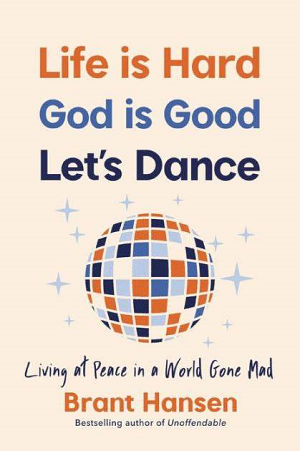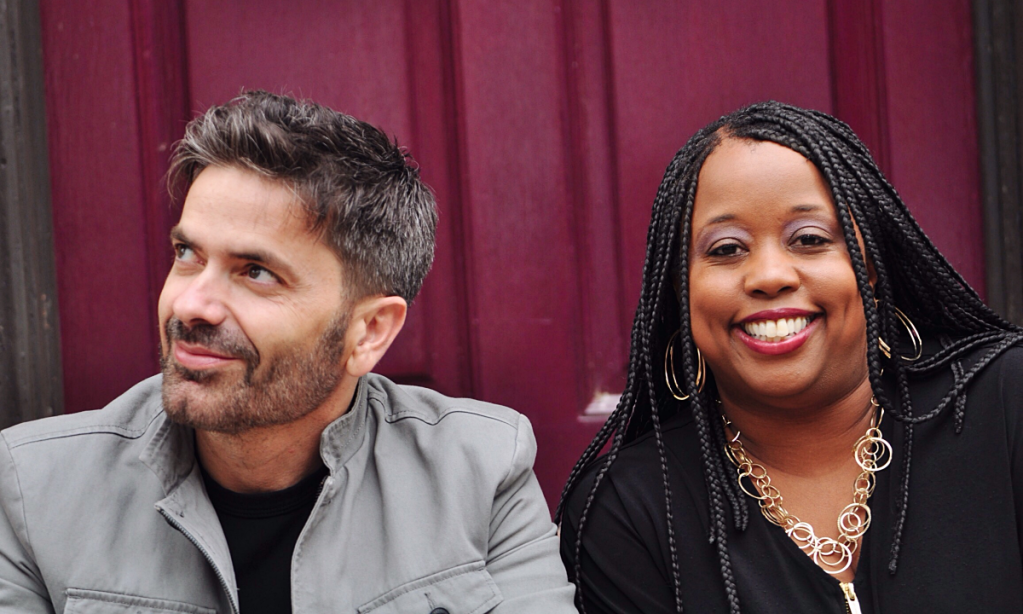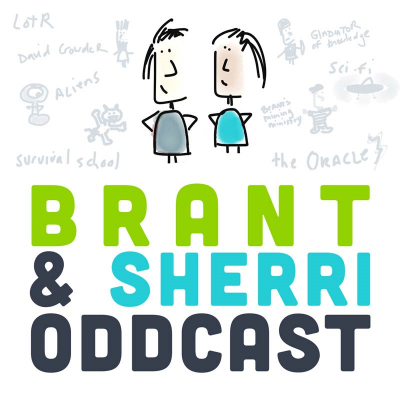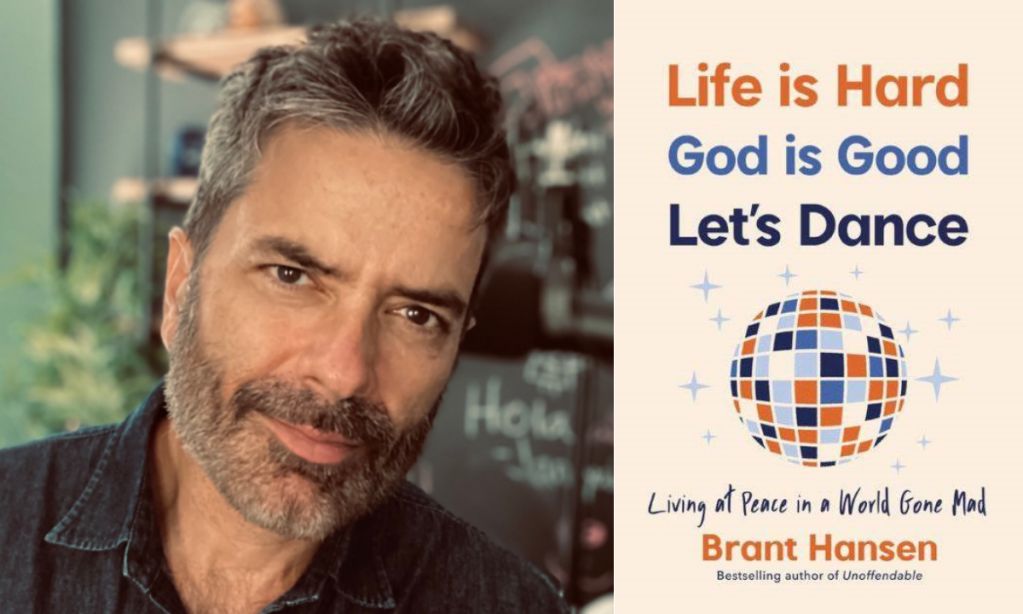Longing for true happiness is a struggle for many of us. It’s fleeting. Thomas Jefferson famously described the ultimate American dream as “life, liberty and the pursuit of happiness.” We have been on that pursuit ever since. However, we often confuse what we need with what we want. We want happiness, but maybe what we really need is joy.
The terms “happiness” and “joy” often go hand-in-hand, but they are not the same thing. Definitions for the two vary, but in general, happiness often comes from external sources while joy comes from within. Happiness is situational and short-lived while joy has the power of being more constant. But our world is a difficult place to live these days. How is it possible to keep a positive attitude? Brant Hansen has a few ideas.
Inspired by Bob and Ted
Brant is the author of a newly released book, Life is Hard. God is Good. Let’s Dance: Living in Peace in a World Gone Mad. published by Thomas Nelson. It is Brant’s belief that those who follow Jesus can achieve a deep sense of well-being regardless of the circumstances by acknowledging that life is hard, but God is good. The chapters are short, filled with interesting stories and quite a bit of humor throughout.

“In this book, I want to take the format of Bob Goff’s Love Does and mix it with my own strange experiences, in a way that I think Ted Lasso would be proud of,” Brant states in the book’s promotional material.
That all sound well land good, but I wanted to know what the book is NOT. I recently spoke to Brant about his book and how pop culture and social media can affect our faith
(Image: Thomas Nelson)
“It’s not about a happy-slappy “joy” that is an emotion. It’s much deeper than that,” says Hansen. “I write with a humorous (?) style, but I also think it’s deeper than many might expect. Not intellectually deep, per se, but deeply reflective.”
This isn’t Brant’s first rodeo. He’s written four other books. In 2014 he wrote his first one, Unoffendable. It was also the year that Brant joined the staff of CURE International, an organization that raises money to provide surgeries for children in other countries who would otherwise not be able to afford it. At the same time, he began recording a syndicated radio show simply-named The Brant Hansen Show.

On the Radio from Coast to Coast
Brant has openly discussed that he has Asperger syndrome and has an eye condition called nystagmus. The latter makes his eyes dart back and forth. He has to compensate by moving his head back and forth as well in order for him to see clearly. Together, they often make for a challenge in social situations. However, Brant says that they make for good radio. He talks very honestly, and he doesn’t have to concern himself on how he comes across on camera. Today, The Brant Hansen Show is carried by over 200 stations from coast to coast and a podcast called the Brant and Sherri Oddcast caries the same content and a little more.
The content found in his books is similar to the insights that he shares over the air with the help of his producer, Sherri Lynn. Their show is distinctive and different from other typical religious programming in that it’s half comedy bits and half thoughtful commentary, which isn’t always easy to do on Christian radio. It’s quite refreshing actually. Having worked together for about a dozen years now, the two play off each other well. Or maybe Sherri just puts up with him.
“You two get along so well. What is the secret?” I ask.
“Mutual gratitude is so much of it,” says Hansen. “I mean, there’s the obvious stuff: Sense of humor, shared worldview, etc. But even those things fall apart after a while for anyone without active gratitude. We’ve both worked with high-maintenance, needy people in the past. I think that helps fuel the gratitude.”

If you haven’t heard the show, you really should. Brant often catches Sherri off guard with his “master class” segments on joke telling or when he tries to be a “shock jock” stating facts that are hard to believe but are true. Her honest reactions and contagious laughter make the show worth listening to.
The Trouble with Social Media
Changing the topic, I asked Brant if he thought that our society is relying too much on social media.
“Definitely. We’re less truly ‘connected’ than ever. Our culture seems almost precision-designed to make us miserable.”
“So, how can people of faith stand out from all the negativity, conspiracy theories and scary trends?”
“We have to pay attention to different things. Attention is everything. It determines who we are becoming. We can’t just hit a switch and suddenly not be angry, or suddenly not be anxious. We have to become different kinds of people, the kind of people to respond the way Jesus does. That takes changing how we structure our days; changing what we’re watching and reading; capturing thoughts and rehearsing true, beautiful things in our minds.
“In both Unoffendable and Life is Hard, God is Good, Let’s Dance, I’m trying to offer ways of actually doing this with regard to anger and anxiety, respectively.”
“What about the people of faith posting online about how they “deconstructing” their faith or abandoning it altogether? What would you say to them?”
“There are so many memes and ideas that seem pithy or like, ‘Hmmm, good point,’ when they’re actually intellectual vapid. But they get traction with people in the internet space, especially younger people who don’t get the rebuttal they need. An example: There’s a meme about ‘Real Biblical Marriage’ poking fun at traditional man-woman marriage, showing how ‘Biblical Marriage’ is actually polygamous or involves killing a guy and marrying his wife, etc. as if all these stories were prescriptive, rather than just describing messed-up humans in real ways. It’s dumb, but people are like, ‘Heh-heh, good point.’
“There’s so much of that, so many silly things that pass for clever. It’s vital that we actually keep talking to God, keep interacting with him, keep reading the Gospels, all that–in order to avoid the cartoonish caricatures of Jesus or his followers that exist in this culture.
“Another note: I’m as skeptical and questioning as they come. But I’m an equal-opportunity skeptic. I question our larger culture, too. Like, “So how’s it workin’? Are deaths of despair going down? Are people happier? More stable emotionally? Do they even know who they are? Are there less addictions? Less confusion? How’s it workin’?”
“Ask tough questions about faith. And ask tough questions about the alternatives, too. Be intellectually honest.”
Let’s Talk About TV
When I reached out to Brant, it was a week or two after the Super Bowl. One ad in particular that aired during that time got a lot of attention. The commercial in question was basically a slide show that featured everyday people acting like Jesus by washing the feet of others despite their differences. I had noticed that a number of people had shared their opinions about these ads online – some in favor of them and others who had theological concerns about them. I was a little surprised by what Brant had to say about them.
What about outreach advertisements like the recent “He Gets Us” campaign? Do you think that they are effective?
“I don’t know. They might be nice, I guess. But they’re also costing $100 million dollars. Give that money to CURE, and we can heal, oh, maybe 100,000 kids and tell them and their families about Jesus. You want to see results? Let’s do that. Let’s be known for that. Healing and telling people about the Kingdom. Actually doing Jesus stuff.

“I feel like we are over-marketed, but since we are Americans, we always think it’s the solution. Our culture is great at advertising and making images. The truth is, we need people to be actual disciples of Jesus, doing the things he told us to do. Until we emphasize that, it’s all P.R. stuff, and I think the world has been marketed to enough. But I’m a weirdo.”
(Image: Thomas Nelson)
“I don’t know. They might be nice, I guess. But they’re also costing $100 million dollars. Give that money to CURE, and we can heal, oh, maybe 100,000 kids and tell them and their families about Jesus. You want to see results? Let’s do that. Let’s be known for that. Healing and telling people about the Kingdom. Actually doing Jesus stuff.
“I feel like we are over-marketed, but since we are Americans, we always think it’s the solution. Our culture is great at advertising and making images. The truth is, we need people to be actual disciples of Jesus, doing the things he told us to do. Until we emphasize that, it’s all P.R. stuff, and I think the world has been marketed to enough. But I’m a weirdo.”
Staying Hopeful
If you listen to Brant’s show, you know that he shares a message of honesty and hope. So, I asked him, how he stays positive. He laughed.
“I don’t know if I sound all that positive here in this interview, but that’s funny. I’m by nature a pessimist. A fatalist, even. Without the hope of the Kingdom, I’d be a nihilist, I’m convinced. But that’s just it: The Kingdom of God is so compelling.
“That’s why I try to write about what I see at these [CURE International] hospitals in my books. No way I’m leaving that behind. Jesus is too compelling. The alternatives don’t work. That hope colors everything. I can appreciate beauty and goodness and truth, and while I don’t like it, I’m told to “wait on the Lord” over and over in scripture, even and especially when it looks like evil is winning. It won’t.”
“That’s why I try to write about what I see at these [CURE International] hospitals in my books. No way I’m leaving that behind. Jesus is too compelling. The alternatives don’t work. That hope colors everything. I can appreciate beauty and goodness and truth, and while I don’t like it, I’m told to “wait on the Lord” over and over in scripture, even and especially when it looks like evil is winning. It won’t.”


Leave a comment